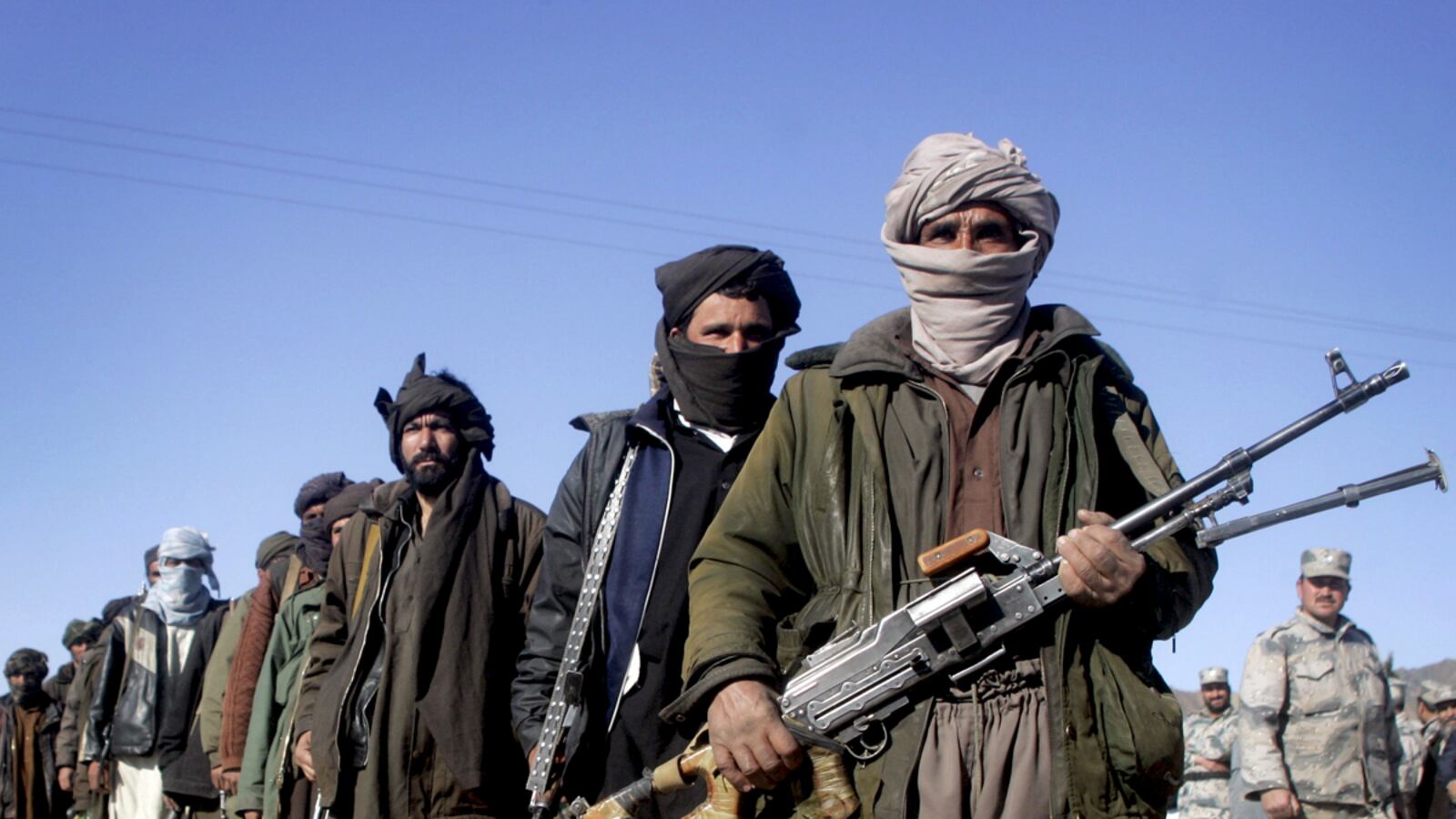Mullah Mohammad Omar can hardly be blamed if he has second thoughts about having entered into peace discussions with his sworn enemy, the United States. As word of the talks first began circulating among the Afghan insurgents several weeks ago, a significant number of field commanders and fighters immediately recoiled at the notion of talking peace with the American occupiers. Now another dispute has broken out over what some of the Taliban leader’s top lieutenants are calling a sophisticated black propaganda campaign, designed to undermine the insurgency’s fighting spirit.
In recent weeks, the group’s ranks have been deluged with copies of a letter apparently signed by Omar himself, calling on the insurgents to “slow down” their military operations and to refrain from injuring civilians while talks continue in the Gulf state of Qatar. Written in Pashto under the letterhead of the Islamic Emirate of Afghanistan (the official name of his defunct Islamic regime) and purporting to be from “The Special Office of the Amir-ul-Momineen”—the Leader of the Faithful, as Omar’s followers call him—the copies have been distributed among fighters on both sides of the Pakistani border and have been delivered to media outlets in Kabul. “All mujahedin of the Islamic Emirate of Afghanistan should restrain and slow down their operations until the end of the negotiating process in Qatar and never attack in places where civilians may be harmed,” the letter instructs. It ends on a hopeful note: “Our main goal is the withdrawal of foreign troops and the restoration of the Islamic system. If our goal can be achieved, we think that the peace talks are worthy, and that anyone obstructing them is not our friend.”
This isn’t the first time Omar (or someone using his name) has told his followers to avoid causing civilian casualties. (They mostly ignore the order, judging by the number of Afghan women and children who have been killed or injured by insurgent attacks.) Nevertheless, many Taliban say the letter’s appeal for restraint and a slowdown proves it’s a fake and an effort to hurt their morale. “This sounds like nonsense to me,” says Mullah Zabihullah, a senior Taliban political operative who has seen the letter. “He is asking our mujahedin to slow down attacks while the Americans are fighting us and killing innocents. This has no meaning at all.” The Taliban’s media office quickly denounced the letter as a “fabrication” and blamed it on the CIA. “This action is clearly the work of the intelligence agency of America to deceive the people,” the group said in an official statement. It added that the insurgency would not reduce its attacks on U.S. and NATO forces, regardless of the peace discussions. “The Americans must unequivocally understand that the ongoing jihad and struggle against them are the Islamic and religious obligations of our nation,” the statement said. “It will continue as long as there is an illegal foreign presence on this soil.”

Despite the official denial, at least some of the letter’s recipients are convinced it’s genuine. One of them, a former senior Taliban government official, says the letter he received bore Omar’s signature and seemed to be written in his style. A ranking Afghan government intelligence official agrees that the language and tone of the letter certainly sound like Omar. “The language is very similar to Mullah Omar’s simple Pashto style,” he says. The former senior official says the letter makes sense to him. “I totally agree with Mullah Omar’s stance in talking to the U.S.,” he says, declining to be named for security reasons. “What’s wrong in halting the game of death for a while during negotiations?” He argues that the letter reflects a serious split in strategy between the Taliban leader and some of his recalcitrant military lieutenants. “I think there is something wrong between Mullah Omar and his top commanders,” he says. “Mullah Omar is trying to impose his view that the talks are necessary.”
In any case, the internal dispute over the letter’s authenticity is making the insurgents more worried than ever about the threat of disinformation campaigns. “The letter could indeed be counterfeit,” says a senior Taliban logistics officer who has seen it. “But what is important is how vulnerable the Taliban are to such conspiracies.” Mullah Omar hasn’t issued a single verifiable communication—video, audio statement, or letter—since he was driven from power in late 2001. As a result, just about any document can be circulated in the Taliban leader’s name with little risk that he might deny it. In other words, as long as Omar remains silent, no one can be entirely sure what the Taliban leader thinks. That’s why his followers wish he would make some kind of verifiable statement—and do it quickly, before rumors and disinformation get any further out of hand. “Mullah Omar has to send us his real voice to eliminate the confusion that may be caused by this letter,” says the logistics officer.
There’s not much disagreement among the insurgents on that point. But after a decade of total silence, it seems unlikely that the reclusive Taliban leader is suddenly about to release a verifiable statement or show himself in public. And genuine or not, the letter’s call for a reduction in violent actions seems to be falling on deaf ears. Two more U.S. soldiers were gunned down in cold blood today by supposedly friendly Afghans. One Afghan soldier and one literacy trainer shot and killed the two Americans at an Afghan National Army training base in southern Afghanistan before being cut down themselves. That makes a total of six U.S. soldiers who have been killed by presumed Afghan allies since anti-U.S. protests erupted nearly two weeks ago, after the discovery of discarded Qurans in a burn pit at Bagram Airfield. Those deaths are in addition to the 70 NATO troops who lost their lives in 42 deliberate attacks by “friendly” Afghan personnel between May 2007 and this past January.






